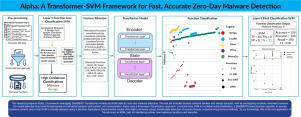零日恶意软件检测与Alpha:快速DBI与Transformer模型的实际应用
IF 4.9
3区 计算机科学
Q1 COMPUTER SCIENCE, HARDWARE & ARCHITECTURE
引用次数: 0
摘要
人工智能模型在对新型恶意软件进行准确分类方面的有效性取决于它所训练的特征的质量,而特征的质量又取决于所使用的分析工具的有效性。Peekaboo是一种动态二进制检测(DBI)工具,可以挫败恶意软件规避技术,从而在汇编(ASM)指令级别捕获真实行为。这种行为表现出与Zipf定律一致的模式,Zipf定律是自然语言中常见的一种分布,这使得Transformer模型对二元分类任务特别有效。我们介绍Alpha,一个利用Transformer模型、支持向量机(svm)和ASM语言特性的零日恶意软件检测框架。Alpha在ASM级别提取的恶意软件和良性软件数据上进行了训练,使其能够以极高的准确性检测全新的恶意软件样本。Alpha从训练数据集中的测试样本中消除任何公共函数。这迫使模型依赖上下文模式和新的ASM指令组合来检测恶意行为,而不是记忆熟悉的特征。通过结合DBI、ASM分析和Transformer架构的优势,Alpha提供了一种强大的方法来主动处理不断发展的恶意软件威胁。Alpha对勒索软件、蠕虫和apt具有出色的准确性,对恶意和良性样本都有完美的分类。结果表明,该模型在检测真正新的恶意软件样本方面具有优异的性能。本文章由计算机程序翻译,如有差异,请以英文原文为准。

Zero day malware detection with Alpha: Fast DBI with Transformer models for real world application
The effectiveness of an AI model in accurately classifying novel malware hinges on the quality of the features it is trained on, which in turn depends on the effectiveness of the analysis tool used. Peekaboo, a Dynamic Binary Instrumentation (DBI) tool, defeats malware evasion techniques to capture authentic behavior at the Assembly (ASM) instruction level. This behavior exhibits patterns consistent with Zipf’s law, a distribution commonly seen in natural languages, making Transformer models particularly effective for binary classification tasks.
We introduce Alpha, a framework for zero-day malware detection that leverages Transformer models, Support Vector Machines (SVMs) and ASM language features. Alpha is trained on malware and benign software data extracted at the ASM level, enabling it to detect entirely new malware samples with exceptional accuracy. Alpha eliminates any common functions from the test samples that are in the training dataset. This forces the model to rely on contextual patterns and novel ASM instruction combinations to detect malicious behavior, rather than memorizing familiar features. By combining the strengths of DBI, ASM analysis, and Transformer architectures, Alpha offers a powerful approach to proactively addressing the evolving threat of malware. Alpha demonstrates excellent accuracy for Ransomware, Worms and APTs with flawless classification for both malicious and benign samples. The results highlight the model’s exceptional performance in detecting truly new malware samples.
求助全文
通过发布文献求助,成功后即可免费获取论文全文。
去求助
来源期刊

Computers & Electrical Engineering
工程技术-工程:电子与电气
CiteScore
9.20
自引率
7.00%
发文量
661
审稿时长
47 days
期刊介绍:
The impact of computers has nowhere been more revolutionary than in electrical engineering. The design, analysis, and operation of electrical and electronic systems are now dominated by computers, a transformation that has been motivated by the natural ease of interface between computers and electrical systems, and the promise of spectacular improvements in speed and efficiency.
Published since 1973, Computers & Electrical Engineering provides rapid publication of topical research into the integration of computer technology and computational techniques with electrical and electronic systems. The journal publishes papers featuring novel implementations of computers and computational techniques in areas like signal and image processing, high-performance computing, parallel processing, and communications. Special attention will be paid to papers describing innovative architectures, algorithms, and software tools.
 求助内容:
求助内容: 应助结果提醒方式:
应助结果提醒方式:


